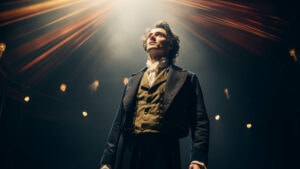People often wonder what the differences are between stage acting and screen acting. People commonly believe that acting on screen is about doing less, or making their movements and expressions more subtle, but this isn’t always correct.
One of the biggest differences between stage and screen acting is that stage actors will change their performance depending on the size of the venue, but screen actors will change their performance depending on the size of the shot.
But this isn’t the only difference between stage and screen acting, there are many more! In this article, I’ll list a few of the biggest differences that will help you understand acting for stage vs screen. So the next time you’re in front of a camera, your performance will come alive.
Table of Contents
Venue Size vs Shot Size
Acting in a 1000 seat theatre is very different to acting in a 30 seat theatre. In a larger venue, actors must project more and perform in such a way that they can be seen from the back row. Whereas in a smaller theatre, an actor can play more to reality, because the audience isn’t that far away.
This can be translated to screen acting. When performing in a long shot, where the whole body can be seen, from head to toe, actors often act larger because subtle movements will be hard to see. When in a close-up, where your face covers the entire screen, every movement in your face will take up a large portion of the screen, and therefore subtler movements are necessary.
If you’ve ever watched a screen performance and thought it looked flat, this is because the actor didn’t adapt to the shot size. If you try to “do less” in a long shot, your performance will be non-existent. Although this doesn’t necessarily mean you should become melodramatic, you still want your performance to seem real, finding the balance comes with practice.
Performing Night After Night

When actors perform on stage, they are usually performing as part of a long theatre run, often with multiple performances per day. This means that a stage actor must bring a freshness to the performance every time. If you say the lines the same way, move your arm at that exact moment every time, your performance will get stale, fast. Audiences are smart, and they will see that it doesn’t look real, whether they know why, or not.
Although it’s important for all actors to be fluid in their performance. When a co-actor reacts or says a line differently, you must act accordingly, in a way that makes sense emotionally, at that moment. But this is arguably more important in theatre, where actors often perform the same play for months on end. If an actor is fluid in their performance the play will come alive and won’t seem stiff or stale.
For screen actors, although the performance still needs to be fluid and adaptable, they will often only spend a few days on a singular scene, so the work is always fresh.
Where to Look?
Have you ever watched a theatre performance and looked at the actors that aren’t speaking or part of the main action? As audience members, we can choose where we want to look. This conveys a feeling of looking in on reality. We feel like a fly on the wall. This is completely different to modern film.
When watching a film, we don’t get to choose where to look. Everything is carefully shot and edited together in a way that we’re told where to look. Movies often make us feel like we’re a part of the story; like we’re amongst the action.
This naturally affects the way an actor performs. On stage, an actors’ whole body is seen, and therefore the whole body must perform in a way that looks real from an outsider looking in. On screen, we don’t always get to see an actors’ full body. We’re watching from a different perspective, this will affect the actors’ performance.
If the characters leg is shaking because they’re nervous, this will be seen on stage. But on screen, in a medium shot, the leg won’t be seen and the nervousness may not be conveyed at all.
Actors Positioning

You may not have realised this before, but now that I say it, you’ll definitely notice it. In films, people often stand incredibly close to each other. Have you noticed this?
The positioning of people works differently for film because we need to fit everything that’s important in the frame and create a composition that is visually pleasing and represents the feeling that the Director wants to achieve. This of course doesn’t happen all of the time, wide shots are often very spacious, but it happens very often, especially in closeups.
When actors stand a normal distance from each other, it often looks weird on camera. Therefore on-screen actors must be comfortable in situations that feel inherently abnormal. How often do you stand shoulder to shoulder when talking to someone? Probably not very often. But this happens all the time in film. If you don’t believe me, watch some movies and keep an eye on the positioning of the actors.
Sure, stage actors will usually turn a shoulder out towards the audience so they can be seen better. And they’ll project their voice to be heard clearly, but other than that, it’s usually closer to real-life than film is.
As we’ve mentioned, when watching theatre it can feel like we’re looking in on someone else’s reality. And theatre is inherently closer to real-life than film. But when the same scene is filmed close up, in-camera it would often look weird unless the positioning is “cheated.”
Cheating is the act of repositioning a person or object to alter the perspective of the scene to create a better composition. This is often done multiple times within a singular scene.
Rehearsal Time & Relationships
In the past, Directors would treat film in the same way as theatre. There would be weeks of rehearsals before the cameras were even brought in. But in the modern-day, 99% of films don’t have a rehearsal period. The turn-around time for movies is relatively short and there’s a lot that needs doing, so there’s not enough time to have full rehearsals. The most they’ll get is a table read and perhaps a few chats with the Director.
It’s common practice for actors to rehearse a scene for the first time while the crew are setting up the cameras and lighting, and the director will make changes to the scene from take to take. In fact, lines are often changed between takes as the Director doesn’t like the way a scene sounds, or thinks that another line would work better.
It’s also very common for an actor to meet their scene partner for the first time, on the day of filming. This means that actors need to come to set extremely prepared, with a firm understanding of the character, but also an ability to make changes to lines and their performance on the spot.
However, when actors rehearse for theatre, they get weeks of rehearsal time, and although it’s still integral that an actor comes to their first rehearsal extremely prepared; the character, relationships and other character development will grow as the rehearsals go on.
Scenes Out of Order

The final difference between acting for stage and screen is that movies are usually shot out of order, although this doesn’t make as much of a difference as you’d think. As long as an actor does their homework, they will come to set prepared and work on that scene with the knowledge of how it affects the full story.
And after all, stage actors will rehearse scenes out of order all the time. But when on stage, performing a full show from start to finish, I will admit that there’s an adrenaline rush that I believe has the potential to push performances to their max. This is also achievable on set, but it doesn’t come as easy. Movie sets are fast-paced environments, as a screen actor, you must learn to thrive in this environment.
So to some degree, performing scenes out of order does make a difference for acting on screen. But ultimately, when an actor does their homework and really develops their character properly, thinking about where a character has been and where they’re going in the story. Acting scenes out of order shouldn’t make too much of a difference.
Is Stage Acting Harder Than Screen Acting?
Stage acting isn’t inherently harder than screen acting, but many actors will have their preferences. Some will prefer stage and find screen acting tough due to the scenes being disconnected. But some will prefer screen acting for the exact same reason.
It’s usually recommended to get experience in both as expanding your knowledge and experience can only help you improve in the long run.
If you’d like to hear more about acting on screen, I’d recommend the reading book Secrets of Screen Acting by Patrick Tucker. This book opened my eyes to some crucial concepts of screen acting and helped correct some unconscious bad habits.








